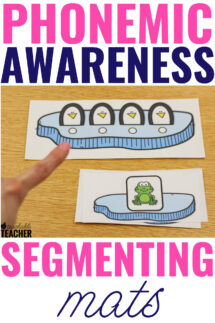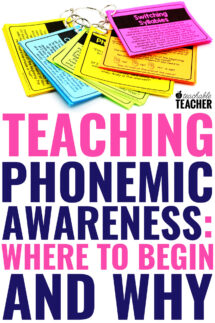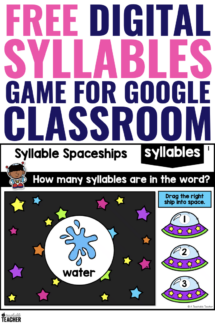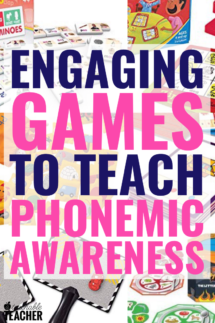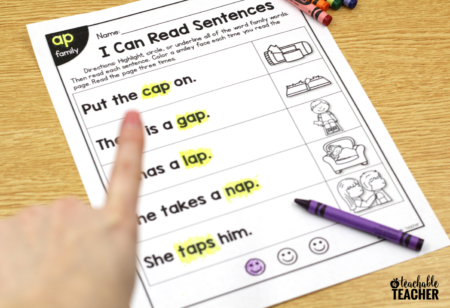I am a huge fan of games (as in Game Night is a favorite in our home ??) and love to use them to teach whenever I can. These hands-on phonemic awareness games are perfect for practice at home and in the classroom.
Games are not only engaging for kids, (and adults ?), but they provide a ton of opportunities for practice and repetition of skills. The games on this list promote phonological and phonemic awareness. They also give kids the chance to practice social emotional skills as they cooperate with one another to play. 👏
Before giving them the opportunity to play these phonemic awareness games with one another, I always play with them first. Often times this is around my guided reading table, but it can also be whole group depending on the game.
Phonemic Awareness Games that Encourage Cooperation and Mastery
Once my kids know how to play correctly (and cooperatively 🥳) I love to add these games into learning centers. They earn me cool teacher points and give my students the chance to practice, practice, practice in a really meaningful way.
When these games aren’t in a center, they are available on a shelf for free moments in our day. I encourage students to pull them out in these moments to get some extra practice.
When we give kids the choice of educational games, they will be benefitting no matter which game they choose!
This post contains affiliate links. By purchasing through this link, we get a small commission that helps support the blog (at no cost to you). Rest assured – we only share links to products that we know and love!
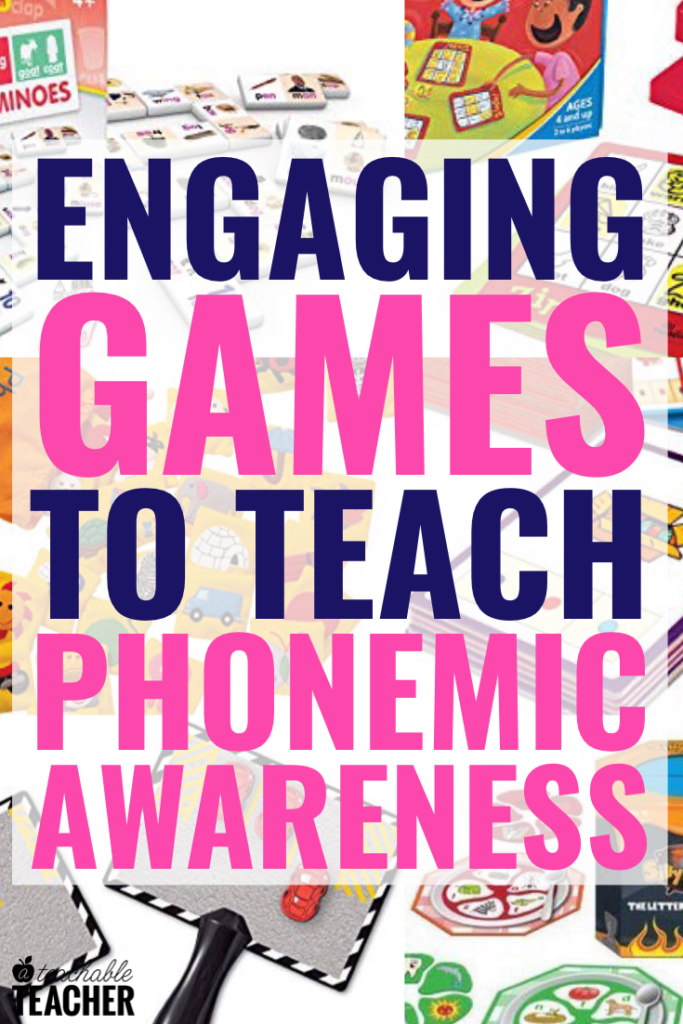
This post contains affiliate links. By purchasing through this link, we get a small commission. Rest assured – we only share links to products that we know and love!
Phonological Awareness VS Phonemic Awareness
Before we get started, do you know the difference between phonological awareness and phonemic awareness?
I used these terms interchangeably for years, but they’re actually quite different.
I’ve explained it all (and even created a little cheat sheet for you) which you can read about here: The Difference Between Phonological Awareness and Phonemic Awareness.
The Skills
In other phonological and phonemic awareness guides (like the best videos and books to cover each skill), I have made recommendations based on each skill. I will not be doing that this time, and for good reason!
Fortunately, these games lend themselves too many different phonological and phonemic awareness skills to practice just one skill during a game!
In this post, I’m sharing my favorite games and the ways we play them to practice all of these important pre-reading skills.
Of course, I am not giving my students all of these activities at once. I am introducing a single activity (in a guided reading group or whole group) for them to do with these materials.
Later in the year, I’ll teach them a different way to use them or a different way to answer the questions (i.e. practice the skills).
Now that we have all of the logistics out of the way, here we go! 🤸🏽♀️
My FAVORITE Phonemic Awareness Games
Junior Learning CVC Word Builders Activity Cards
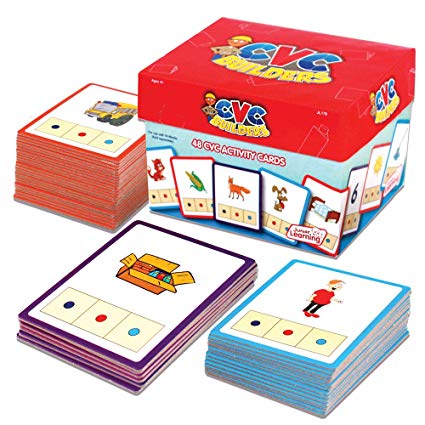
These cards are excellent for practicing sound discrimination. The CVC words are displayed in picture form with dots underneath. In their simplest form: students can say the sounds as they point to each dot, identifying beginning, middle and end sounds.
Additionally, the cards can be used for identifying same beginning (or middle or end!) sounds. I have students find a “match” with the same sounds.
There are also cards that are in the same word families. These words rhyme, so students can find the rhyming matches. They can also identify which sound has been changed to create the new word which is practicing phoneme manipulation 🙌
Skills practiced:
- sound discrimination
- rhyming
- phoneme manipulation
Junior Learning Silly Soup Board Game
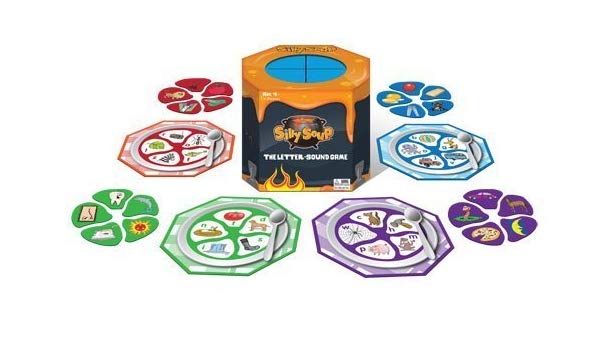
This fun game is perfect for practicing beginning sound discrimination. Students make a soup by getting different silly ingredients to add to their bowls.
Both the bowls and the ingredients they are looking for have pictures on them. They match the right ingredient by matching the beginning sound. For example, students match a picture of a van on the bowl and an ingredient with “volcano” on it.
To extend this game further, we practice syllables with these pictures. They don’t match in the exact spots but it does work! For example “volcano” and “tomato” both have three syllables, so those would be a match!
Skills practiced:
- sound discrimination
- syllables
Learning Resources Sound Box Answer Boards
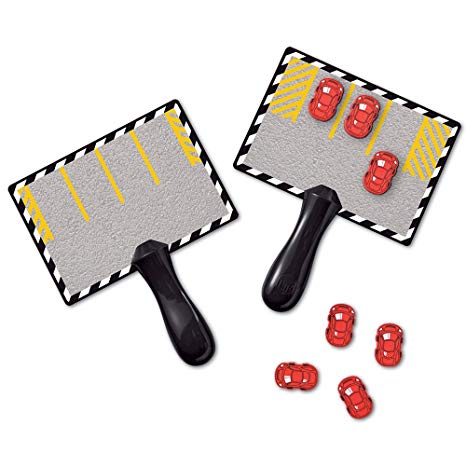
These sound box boards are a HUGE hit with my students. The cars and boards are magnetic so they can be held up. We match them with the cards above to make an independent game.
One student will flip a card into the middle. Then they add cars to their parking lots and share the sounds they have made. This practices sound discrimination, segmenting and blending. We also use these cards to practice syllables in the same way.
Skills practiced:
- sound discrimination
- segmenting
- blending
- syllables
Junior Learning Rhyming Word Dominoes
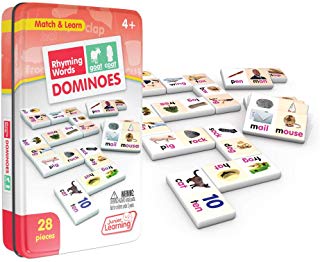
These rhyming dominoes are a favorite of mine because they really make my students think. They have to find a rhyme (like cat/hat) to match the dominoes together.
We also use these dominoes to practice sound discrimination by matching the beginning, middle, or ending sounds as well.
Students can take turns picking dominoes to find matches, separate them into groups and put them down one at a time, or work together to find matches for all of them. Each way of playing works well!
Skills practiced:
- rhyming
- sound discrimination
I Spy a Mouse in the House! Picture Rhymes Game
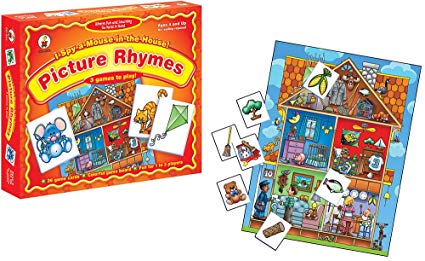
In this game, students are looking for rhyming matches on their cards and in the house. We mainly use this one for rhyming but it can be used again to practice other skills.
Students can match picture cards to things they see in the house based on the sounds they hear in words. They can also do this with syllables.
Skills practiced:
- rhyming
- sound discrimination
- syllables
Spot It
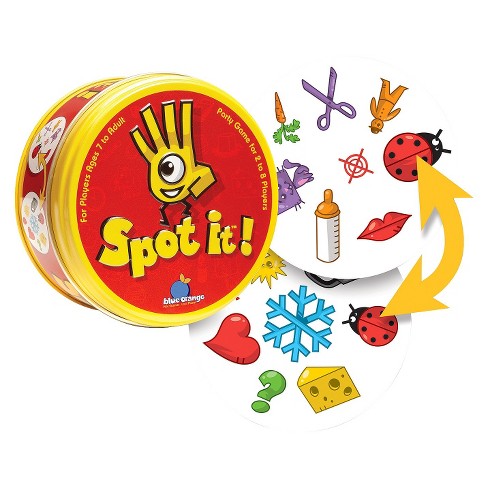
We can’t get enough of Spot It and the many, many ways to play it! If you have never seen this one before, I can’t recommend it enough.
There are circular cards in a tin. Each card has pictures on it and is completely unique. Every card has only ONE picture in common with each other card. I honestly can’t fathom how this works. It is pure magic ?
Anyway, we use these cards to practice ALL of the phonemic awareness skills! Yes, they are that diverse. 👏
When you find a match, you have to say it, then answer a question based on the skill. For example, say I find the ladybug match:
Sound discrimination: ladybug starts with /l/, like leaf! (You can also do ending sounds!)
Rhyming: ladybug rhymes with coffee mug (this one can be really tricky so we do LOTS of practicing before putting it out with rhyming)
Syllables: ladybug has three syllables – clap it out la-dy-bug
Segmenting: ladybug, /l/ /a/ /d/ /y/ /b/ /u/ /g/
Phoneme deletion: ladybug without the /l/ is “adybug”
Phoneme manipulation: ladybug with a /k/ is “kadybug”
We play this game in so many different ways because it is SO fun. It is typically a game of speed (Who can find the matches the quickest?), but this really helps slow it down.
Skills practiced: all of them! 🥳
Educational Insights Phonics Beanbags
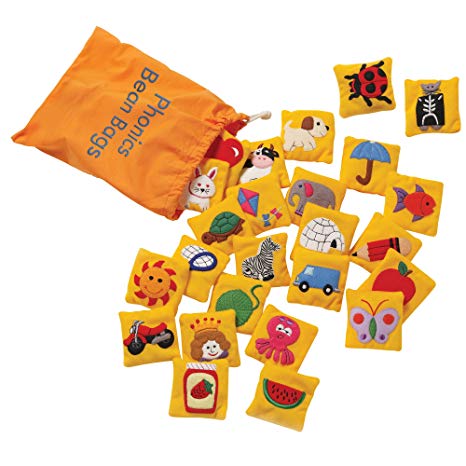
Just like Spot it!, we use these beanbags for all of the skills 🤯
These fun beanbags add the element of a more physical game play. We may toss them into bowls or rings based on the number of syllables or sounds.
Skills practiced: all of them! 🥳
Zingo
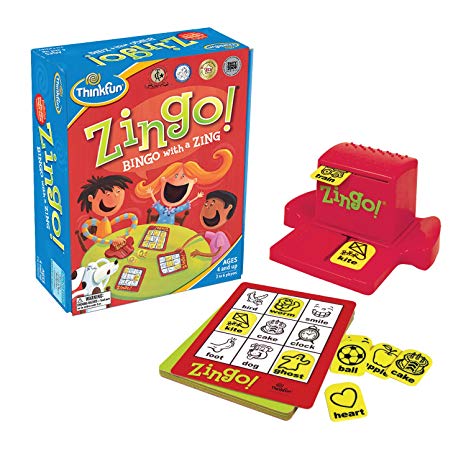
This game is super fun because it slides forward to reveal the little chips with pictures on them. We use them for many of the skills, just like Spot It! and the Phonics Beanbags.
Students are matching the pictures to the pictures in the most basic form of this game. However, it is possible to use them for other phonemic awareness skills as well!
We match pictures that have the same sounds and the same number of sounds. We also play it in the same way we do with Spot It! where they come up with new words based on the skill we are practicing before they can place their match on their board.
Skills practiced: allll of them 🥳
These phonological and phonemic awareness games are such a great opportunity for our new readers to practice these skills independently. All of the repetition really helps them “get it” even when I can’t quiz them one-on-one all day. 🤗
How do you like to practice phonological and phonemic awareness with your new readers? Do you have any favorite games to play? I would love to chat about it below! 👇
If you’re looking for looking to add more phonemic awareness practice into your day, check out these FREE Phonemic Awareness Worksheets!

